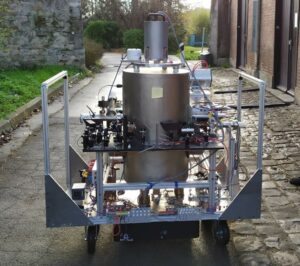
Quantum technology is a term that has been increasingly discussed in scientific communities and industries alike. But what is quantum technology? In simple words, it refers to a range of new technologies that are based on the principles of quantum mechanics, the fundamental theory in physics that describes nature at the smallest scales, such as those of atoms and subatomic particles.
What is Quantum Technology?
To understand what is quantum technology in simple words, one must first, grasp the basics of quantum mechanics. Quantum mechanics is a branch of physics that deals with phenomena that occur at the nanoscopic scale. At this scale, particles like electrons and photons behave in ways that are dramatically different from the objects we interact with in our everyday lives.
Quantum technology leverages these unique properties to develop new kinds of devices and systems. For instance, quantum superposition allows particles to exist in multiple states simultaneously, and quantum entanglement enables particles to be instantaneously connected across vast distances. These properties are not just theoretical curiosities; they are the foundation upon which quantum technology applications are built. Since the 1930s, with the development of semiconductor materials, quantum mechanics has been present in our devices, given that the theory behind these materials is purely based on quantum phenomena with the band theory. After that, many other technologies have come, like transistors and laser technology.
(SEMICONDUCTOR IMAGE) reference: www.chemistrytalk.org
But you might be pondering: “Okay, but they are not the same technology in some way, or at least they do not seem to be? These are much more sophisticated”. And you would be right.
The technologies mentioned, such as semiconductor materials or lasers, belong to what is called the first generation of quantum technologies. More recent advancements, such as quantum computers and quantum sensors, belong to the second generation of quantum technologies.
First-generation and second-generation quantum technologies primarily differ in their level of control and exploitation of quantum phenomena. First-generation technologies use quantum effects indirectly and were developed based on a basic understanding of quantum mechanics. Second-generation technologies harness quantum phenomena such as superposition and entanglement directly and in a controlled manner to develop new applications.
Today we will be talking about the technology related to the Second-generation quantum devices.
Quantum Technology Applications
There are several reasons that have led humanity to explore quantum technologies for implementation in crucial industry sectors such as computing design, sensing, cryptography, and logistics among others. Often, these branches have followed similar developmental paths throughout history in the theoretical plane, diverging primarily during the implementation and device design stages due to common quantum principles.
For this article, we are going to explore some of the main technology applications in the relevant fields of the current quantum landscape, focusing on a general description of the field. In further sections, we will describe detailed cases of companies that harness quantum advantages to position themselves at the forefront of the industry.
Here are some of the most significant quantum technology applications:
- Quantum Computing: This is perhaps the most talked-about application. Quantum computers use qubits, which can represent and process information in ways that classical bits cannot (visit our previous article “Quantum Computing for Dummies” to better understand this concept). This allows them to solve certain types of problems much more efficiently than classical computers. In some cases, problems that were unsolvable by classical computers have been solved, marking a milestone in the quantum path known as quantum supremacy.
- Quantum Communication: Quantum key distribution (QKD) uses the principles of quantum mechanics to create secure communication channels. This could be critical for securing data transmissions against eavesdropping. The fundamental quantum mechanic principle related to this feature is the collapse of the wave function. Any quantum system, including systems created for this purpose, loses all its quantum behaviour if intercepted or perturbed by external contributions, making it an ideal scenario for creating security systems based on this quantum mechanic principle.
- Quantum Sensing and Metrology: Quantum sensors can achieve levels of precision that are impossible with classical sensors. These could be used in a variety of fields, from navigation and medical imaging to detecting gravitational waves. In this case, the technologies leverage the isolation of quantum systems, but the operational schematic is based on perturbations over these isolated systems rather than working with the systems themselves to operate specific algorithms. For instance, a quantum gravimeter uses the gravitational forces acting on the quantum system to determine its location in the world.
Quantum Technology Sciences
As you can imagine, the sciences behind quantum technology are deeply rooted in quantum mechanics. Nevertheless, the branches of science involved are very broad, as quantum technologies permeate many layers of the industry.
Some of the main relevant for the current state of the industry would be quantum physics, given that all quantum mechanic principles rely on this science, quantum chemistry, as some types of quantum computers can replicate physical systems, the direct application for drug discovery or protein folder is direct. Finally, we can place here quantum information science, this science is present overall in branches which have a relation with algorithms such as cryptography or communication, information isa key piece in those branches and need a strong math and physics background.
Researchers in these fields are working to understand and manipulate the quantum states of particles to develop new technologies.
For instance, quantum dots are tiny semiconductor particles that have quantum mechanical properties, enabling them to emit light at specific wavelengths when subjected to UV light. This property is highly valuable for a range of applications, including medical imaging, where they can be used as fluorescent biomarkers to track biological processes at the cellular level with high precision. Additionally, they are being integrated into solar cells to improve their efficiency by broadening the spectrum of light that can be converted into electricity.
Understanding what is quantum dot technology can help in developing of many transversal branches of science due to its low cost and easy implementation.
Thus, we have seen some quantum technology branches that intersect with critical industrial sector to enhance their productivity and product itself. Now, we will dive into the importance aspect and specific utility of these sciences.
Why is Quantum Technology Important?
Although this point should be clear by now, one might wonder, why is quantum technology important? What would happen if we do not explore the different quantum technologies and remain in the ‘classical stage’? How bad would it be? The reality is that current technology is reaching certain limits. For example, in computational science, Moore’s Law establishes an upper bound for the reduction in the size of transistors. In fact, we have already reached this limit. If we create more miniaturised transistors, they will not work correctly, as quantum phenomena such as the tunnel effect will appear. Therefore, to increase our computational power, we needed to explore the field of quantum computing.
Something similar occurs in the aforementioned field of quantum chemistry. Over time, migratory flows of people increase as transportation technology advances and cultural barriers diminish. The spread of diseases has become more prolific, as we observed with COVID-19, where in a matter of months, the entire world was affected. Therefore, the development of vaccines and medicines must accelerate exponentially, and with classical technology, the computational limit is clear. Quantum computing, however, can provide the quantitative leap needed for the field to achieve new and better drugs much faster, addressing the growing need and, in the process, saving millions of lives and saving billions in treatments.
Similar cases exist in quantum chemistry with protein folding, a problem that could not be simulated due to the high computational demands.
Summarizing, the significance of quantum technology lies in its potential to solve problems that are currently intractable with classical technologies. Moreover, the development of quantum technology is expected to spur economic growth and create new industries and job opportunities. As such, countries around the world are investing heavily in quantum technology research and development.
What is Quantum Technology Used For?
As we have seen, quantum technology is used in various cutting-edge applications that have the potential to transform numerous industries.
Some of the current and potential uses include:
- Secure Communications: Quantum encryption could ensure the security of sensitive information. Quantum key distribution (QKD) uses the principles of quantum mechanics to create theoretically unbreakable encryption. By detecting any attempt at eavesdropping through the collapse of quantum states, QKD ensures that any intercepted communication is immediately identified and discarded, making it ideal for government and military communications, financial transactions, and other sectors where data security is paramount.
- Medical Imaging: Quantum sensors could provide more detailed images, aiding in early diagnosis and treatment. For example, quantum-enhanced MRI machines can achieve higher resolution and contrast than traditional MRI machines, allowing for the detection of smaller tumours or abnormalities at an earlier stage. This could significantly improve patient outcomes by enabling earlier intervention and more precise targeting of treatments, such as in cancer therapy.
- Navigation: Quantum gyroscopes and accelerometers could lead to more accurate navigation systems, even without GPS. These quantum devices, based on the principles of quantum interference and entanglement, can measure orientation and acceleration with unprecedented precision. This can be crucial for submarines, spacecraft, and autonomous vehicles
Quantum Technology Course
Since quantum computing was proposed in 1981, the advancements have been steadily increasing, particularly in recent years with exponential growth. For example, the first quantum computer based on nuclear magnetic resonance (NMR) with what could be considered just 2 rudimentary qubits was created in 1998. Just a year later, the first superconducting qubit was developed, which has been the most established paradigm up to now. It took some time for quantum computing to flourish due to the challenges in hardware implementation, such as managing isolated physical systems at -273°C, among other things.
Thus, in 2019-2020, Google and IBM respectively proclaimed quantum supremacy over classical computing. Since then, IBM, being the company with the highest standardisation of software and hardware through its IBM Quantum platforms and various quantum computers distributed worldwide, has served as a roadmap indicator year after year, leading the way in terms of the number of superconducting qubits their quantum computers possess.
However, in recent years, with the rise of other companies like ionQ, Universal Quantum, Quantinuum, etc., IBM’s annual roadmap has received less attention. Nevertheless, it would be unfair not to consider it as a guide due to the company’s history and the quality of the information, as seen in the image.

(IBM ROADMAP 2024) reference: IBM
Link: 2024 IBM Quantum roadmap update – IBM MediaCenter
There, we see that current superconducting paradigm computers are around 133 qubits, although some companies are about to launch 150-qubit systems. For next year, the launch of 156-qubit computers is anticipated.
Examples
To better illustrate the impact of quantum technology, here are some interesting examples of real-world use cases:
In the case of quantum computing, there are numerous striking applications where this technology has been implemented, especially when exploring optimisation problems, which include some of the most remarkable examples. For instance, algorithms are already being implemented to optimise schedules and beds for admissions and discharges in hospitals. Each extra or fewer day a patient spends admitted translates into a significant amount of money lost or gained. With current computers (even supercomputers), the number of variables to consider makes this problem intractable due to the multitude of patients, hospital sections, medications, and other factors. Another interesting case is the use of quantum computing for menu generation, whether in hospitals or schools. Thousands of food items can be combined to generate an annual menu where each day contains the necessary average nutrients without repeating dishes each week. It might seem trivial, but knowing the exact amount of food to purchase annually for so many people can result in incredible savings when buying such foods in bulk.
In the case of quantum cryptography, it is interesting to note that all major banks worldwide already have quantum computing departments. These departments are not only preparing for the post-quantum era, where their security systems will be at risk and they will need to address these challenges but also implementing algorithms within their architecture due to their utility. For example, Grover’s algorithm is being used for searches in unstructured databases, and the Quantum Approximate Optimisation Algorithm (QAOA) is also being applied. Another interesting and somewhat more dangerous case is national cybersecurity. Numerous initiatives are launched throughout the year to find creative, intelligent, and efficient solutions to implement in their state security networks, with the defence sector, as with any other technology, aiming to stay ahead.
In the field of quantum sensing, there are also striking and useful applications that might be difficult to imagine without prior knowledge. For example, in the automotive sector, there are already quantum sensing departments developing systems capable of detecting impurities in a car’s oil or fuel. This would translate into an extension of vehicle lifespans, having an astonishing global impact. Another interesting case is the creation of gravimeters, devices capable of detecting variations in the Earth’s gravitational field. The intention behind these devices is to act as a GPS without the need for satellites or the internet, making them offline geolocation systems. This concept is particularly intriguing for various applications, such as vehicles and portable devices for hiking. Naturally, it also garners significant interest within the defence sector.

(GRAVIMETER IMAGE) reference: Quantum Gravimetry | GGOS
By leveraging these advanced quantum principles, quantum technologies are set to transform numerous industries, enhancing capabilities and opening up new possibilities that were previously thought to be out of reach.
Conclusion: Quantum technologies are cool!
If you have read the entire content of this article, you should now be able to answer the question: what is quantum technology? Additionally, you should be able to give examples of applications and specific industries that have implemented them.
In summary, understanding what is quantum technology in simple words involves recognising it as a suite of technologies grounded in the principles of quantum mechanics. Its applications are broad, ranging from computing and communication to sensing and imaging. The sciences behind these technologies are complex, yet they hold the promise of revolutionising our world in ways we are just beginning to imagine.
As the field progresses, education through quantum technology courses will be essential in preparing a workforce capable of advancing and utilising these technologies. The importance of quantum technology cannot be overstated, as it has the potential to impact every aspect of our lives, from healthcare to national security.
Quantum technology is not just a futuristic concept; it is a blooming reality that is set to transform the way we live and work. Whether through the development of new materials, the enhancement of computational power, or the securing of communications, the possibilities are as vast as they are exciting. Understanding what is quantum technology used for and why it is important will be crucial as we navigate the technological landscape of the future.
More articles you might like:
🔎Exploring the Quantum Ecosystem: Key Players and Innovations


